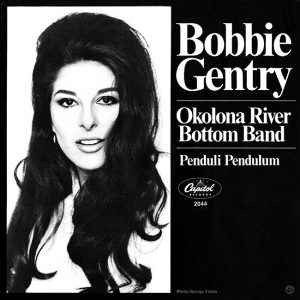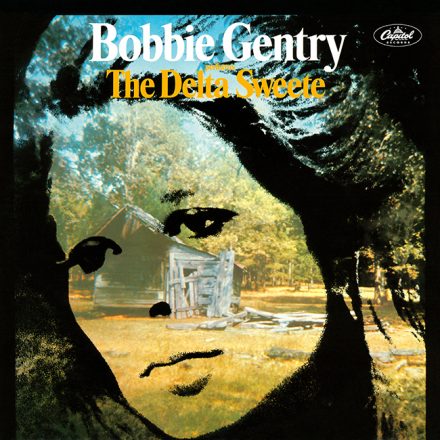Click on the song titles above for lyrics and songwriting credits
The Delta Sweete is Bobbie’s second album and along with 1971’s Patchwork, is considered by fans and critics alike to represent the pinnacle of her artistry. Whilst the album may not have contained anything as career defining as the song Ode to Billie Joe, it represented a definite step forward from her debut in its musical ambition: The result was a multi-faceted quasi-concept album about Bobbie’s Mississippi delta roots where each track blurred, dream-like, into the next; a pungent evocation of her childhood that further deepened her fascination with charade, illusion and the often comic absurdity of the conventions of everyday life.
Although Capitol’s in-house producer Kelly Gordon is credited on the album sleeve, most of The Delta Sweete’s innovative, sophisticated sound is down to Bobbie herself, who played almost every instrument on the record including piano, guitar, banjo, bass and vibes. The swampy southern groove of Oklona River Bottom Band (the album’s lead single) mingles with the proto-rap of Reunion. Her voice enters on the exquisite Mornin’ Glory like sun filtering though curtains, crooning with a sensuality to rival Dusty Springfield’s Breakfast In Bed. The eerie chamber-pop of Refractions and Penduli Pendulum, give a hint of psychedelia, whilst the haunting folk fables of Jessye’ Lisabeth and Courtyard exude a sense of foreboding, sadness and loss that saw Bobbie memorably described as a ‘Mississippi Sandy Denny’.
Even the cover versions blend into the landscape: Mose Allison’s chain-gang lament Parchman Farm, Al Smith and Luther Dixon’s blue-collar drama Big Boss Man, and John D Loudermilk’s perfectly bittersweet Tobacco Road, delivered here with cinematic wild west flourishes of Mariachi band and strings: All were incidentally staples of the British Invasion groups of the period. Honouring the local church’s role in Bobbie’s musical education, Sermon shakes up the traditional spiritual Run On into something perversely joyous. Doug Kershaw’s Louisiana Man is perhaps the LP’s least adventurous cover, certainly it feels the most out of place; released as a single in the summer of 1968 it was a minor hit.

The album was released in March 1968, but failed to match the success of its predecessor, it nevertheless remains one of the great unsung masterpieces of the 60’s. After it’s initial U.S release, the album was re-issued by Capitol as Tobacco Road in 1971, minus Big Boss Man and Parchman Farm. The Delta Sweete was also repackaged in the U.K. as Way Down South for EMI’s budget label mfp in 1972.

